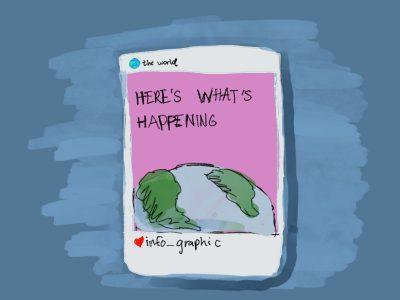Bzzz!
Oh no, what now? Another post from someone you follow. Is it one more ill-conceived infographic, hateful screed or impassioned tirade?

Years can go by when it seems like nothing of note has happened, then all at once, in a matter of days, you realize you’re witnessing history with your own eyes. Recently, it’s increasingly seeming like those years with nothing to note belonged to a bygone era.
It’s a rhythm and flow every young adult has had to become accustomed to. You go about your largely apolitical life, minding your own business, until every few months – another polarizing news story breaks.
And you get that familiar sinking feeling in your stomach, as every screen in your periphery begins blaring the same headlines, and the mass psychosis descends again upon everyone you know and love.
This is not about the conflict. This is about the conflict about the conflict. About the experience of watching history unfold from half-a-world away, in our globalized, digitized day and age.
Some may say this is the quintessential “first world problem.” You have to watch death and destruction from the comfort of your living room? Oh, woe is you. You have to take the time to educate yourself about an issue that’s been affecting people for decades? What a pity. You have to pick a side? Cry me a river.
Those in this camp would argue — when lives are on the line — that becoming educated, forming an opinion and, most importantly, trying to sell that opinion on the marketplace of ideas should be the bare minimum to ask from a concerned global citizen.
And they might be right. There are still concerns, however, that perhaps some of the ways we go about expressing our concerns nowadays may actually be doing more harm than good.
Like it or not, the primary medium of human interaction, especially for political discourse, has come through social media — totally altering the way us moderns receive, process and disseminate information.
The subscription-based model that was the journalism industry’s cornerstone for well over a century has rapidly eroded since the rise of the internet. Sensationalism and outright misinformation have always existed when talking about “the news,” but now more than ever, news is driven less by any high-minded professional values and instead by one thing and one thing only: audience engagement.
You open your phone or turn on your laptop to be instantly bombarded by more posts, links and articles than you could ever possibly hope to consume, each one with a flashier thumbnail and attention-grabbing headline than the last. Click, skim, share. All the while feeling self-righteous for making a change in the world. But are you?
That’s the question. Most would concur that when it comes to matters of war and peace or life and death, it’s irresponsible to simply choose ignorance. One should decide where they stand on an issue, for their own sake, if not to try and make change also.
However, when you’ve developed a conviction it’s only natural wanting to persuade others toward your point of view. We are moral creatures after all. But how should you go about doing that?
Social media, with its ability to reach thousands, if not millions or billions of people in a fraction of a second, may seem like the obvious choice. Which is why so many people feel pressured to post their opinions whenever a controversial subject comes to dominate the discourse.
For some, it may even start to feel like the most important thing about what you say about a subject is what it says about you. Our social media presences and identities have become so inextricably linked through living our lives online, that we commodify political opinions for the sake of our own personal brand.
Herein lies the danger, “slacktivism” or “performatism,” or whatever you want to call it, gives a shallow understanding of what is happening in the world and false sense of satisfaction like you’ve actually done something to change it.
But that’s a pretty cynical worldview. If not social media, then what? Protesting, petitioning, organizing? Well, yes. Each of those options would probably be more effective, but the same logic still applies, they’re all essentially just drops in an ocean.
But our input cannot be totally meaningless, right? If the pulse of public opinion was strong enough then our rulers would eventually have to listen to us. Right?
Even if that were true, it still leaves you feeling directionless, hopeless even. You have deep-seated convictions about how you think the world should be, and yet absolutely no avenues to act on them.
As the bombardment of opinions drag on week after week, media fatigue eventually sets in, and those who feel they’ve done their part by posting the right posts and hashtagging the right hashtags quietly return to their lives as usual.
Living through history can be both exhausting and energizing. It can fill you with dread or zeal, especially when you have the powerlessness of the average person and the anonymity of the internet. Should you take to Instagram, or the streets, to try and educate or inflame the masses, or just accept your impotence and try to mind your own business?
It’s imperative to decide for yourself. Because history will continue to unfold before you, whether you pay attention to it or not.
This Editorial was written by Opinion Co-Editor Nathan Metcalf





















































































































